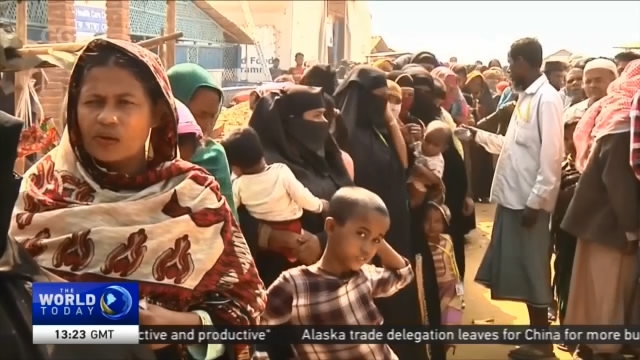
21:53, 20-May-2018
Rohingya Crisis: What it will take for the UN to sign off repatriation plans
02:57

Almost 700-thousand Rohingya refugees have fled Myanmar over the past nine months. Now discussions are focused on how they can return home. It seems highly unlikely many will voluntarily go back without encouragement from the United Nations. Dave Grunebaum has more on what it will take for the UN to sign off on a plan.
These are camps that were built in Myanmar for Rohingya refugees currently in Bangladesh. So far there's been little use for them as hundreds of thousands of refugees remain on the Bangladesh side of the border.
Myanmar says it's ready for repatriation to start but it's still working on a memorandum of understanding with the United Nations refugee agency.
EDWARD BENSON UNITED NATIONS REFUGEE AGENCY "There's no question that UNHCR needs a lot more access than we currently have to verify the situation on the ground."
The United Nations which is actively working in the refugee camps in Bangladesh is still largely shut out of northern Rakhine State in Myanmar.
DAVID GRUNEBAUM YANGON "The UN's refugee agency says it needs teams on the ground for a close-hand look before it will encourage any refugees to go back to make sure they would be safe, have access to food as well as health care and live in viable communities."
EDWARD BENSON UNITED NATIONS REFUGEE AGENCY "You need to see the conditions from where the refugees fled, you need to see the conditions in terms of all communities who chose not to flee and if there were to be large numbers of people or any numbers of people returning, what sort of conditions would they be returning too."
Myanmar's security forces are accused of extrajudicial killings, gang rapes and burning down scores of Rohingya villages, accusations the military denies. Refugees say there are certain things they want before going back.
NEED DUBBING NOOR HOSSAIN ROHINGYA REFUGEE "They must give us the compensation for those Muslims they killed and looted, and for destroying our fields and cattle. They must return our houses and if they show us equality. Then we can go back."
In central Rakhine State, there are currently more than 100-thousand Rohingyas who lost their homes in riots more than five years ago.
They're still living in camps waiting for a chance to return to their old neighborhoods. They face limits on their access to education, health care and restrictions on where they're allowed to go.
There are serious concerns that Rohingyas who repatriate from Bangladesh could end up stuck in the same situation.
EDWARD BENSON UNITED NATIONS REFUGEE AGENCY "We certainly don't want to see a repeat of the situation that we still see five years later in central Rakhine State."
The Myanmar government says any refugees who repatriate would only be in camps temporarily. But human rights groups don't believe it.
PHIL ROBERTSON HUMAN RIGHTS WATCH "Myanmar is offering return possibly on an indefinite basis to open air detention centers."
Meantime while discussions and debates continue, the future of hundreds of thousands Rohingya refugees hang in the balance. DAVID GRUNEBAUM, CGTN, YANGON, Myanmar

SITEMAP
Copyright © 2018 CGTN. Beijing ICP prepared NO.16065310-3
Copyright © 2018 CGTN. Beijing ICP prepared NO.16065310-3